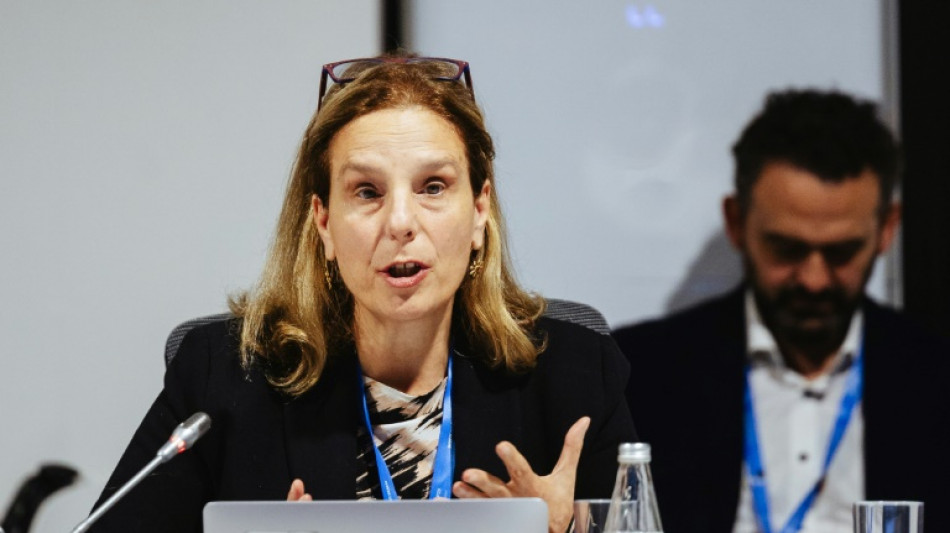
-
 Galthie recalls hulking locks Flament, Meafou for Italy
Galthie recalls hulking locks Flament, Meafou for Italy
-
Turkey, Saudi sign major solar power deal

-
 US Olympic freeskier Hess embraces 'loser' tag after Trump blast
US Olympic freeskier Hess embraces 'loser' tag after Trump blast
-
European stocks rebound, oil prices ease after US-Iran volatility

-
 'Alpha male' AI world shuts out women: computing prof Hall
'Alpha male' AI world shuts out women: computing prof Hall
-
New Zealand freestyle skier Ives in hard Olympic crash

-
 New Zealand must adapt quickly to Sri Lanka wickets: Chapman
New Zealand must adapt quickly to Sri Lanka wickets: Chapman
-
Thai activist's jail term for royal insult extended to 30 years

-
 Families of Duterte's drug war victims eye Hague hearing with hope
Families of Duterte's drug war victims eye Hague hearing with hope
-
India chases 'DeepSeek moment' with homegrown AI

-
 UN touts panel for 'human control' of AI at global summit
UN touts panel for 'human control' of AI at global summit
-
Ukraine Paralympics team to boycott Opening Ceremony over Russian flag decision: statement

-
 UK monarchy reels from Andrew's stunning arrest
UK monarchy reels from Andrew's stunning arrest
-
Somaliland, where Muslims love Israel

-
 Florida airport to be renamed after US President Donald Trump
Florida airport to be renamed after US President Donald Trump
-
Fans flock to Japan zoo to see viral baby monkey Punch

-
 Stocks mixed, oil rises after Trump Iran threat
Stocks mixed, oil rises after Trump Iran threat
-
Outspoken Laos lawmaker's election exit sparks rare dissent

-
 Kim Jong Un vows to boost living standards as he opens rare congress
Kim Jong Un vows to boost living standards as he opens rare congress
-
Shepherd hat-trick to Samra ton: Five top T20 World Cup performances so far

-
 Zimbabwe surprise as T20 World Cup Super Eights begin without Australia
Zimbabwe surprise as T20 World Cup Super Eights begin without Australia
-
Victorious Takaichi promises 'strong and prosperous' Japan

-
 Ex-South Korea leader apologises for martial law crisis
Ex-South Korea leader apologises for martial law crisis
-
Ex-S. Korea leader apologises for martial law crisis

-
 Messi kicks off MLS season in key World Cup year
Messi kicks off MLS season in key World Cup year
-
Teen burnout to Olympic gold: Alysa Liu 'looking to inspire others'

-
 Cunningham stars as NBA-leading Pistons ease past Knicks
Cunningham stars as NBA-leading Pistons ease past Knicks
-
Andre Gomes joins MLS side Columbus Crew

-
 Scottish inconsistency 'bugs everyone' says former international Beattie
Scottish inconsistency 'bugs everyone' says former international Beattie
-
England turn to Pollock for Six Nations boost against Ireland

-
 Arsenal aim to banish title jitters in Spurs showdown
Arsenal aim to banish title jitters in Spurs showdown
-
Scrutiny on Flick rises as Barca seek recovery

-
 Leipzig host red-hot Dortmund with Champions League hopes slipping away
Leipzig host red-hot Dortmund with Champions League hopes slipping away
-
Nvidia nears deal for scaled-down investment in OpenAI: report

-
 Japan inflation eases in welcome news for PM Takaichi
Japan inflation eases in welcome news for PM Takaichi
-
McIlroy shares Riviera clubhouse lead as Rai charges, Scheffler fades

-
 Philippines' Duterte earned global infamy, praise at home
Philippines' Duterte earned global infamy, praise at home
-
Stocks drop, oil rises after Trump Iran threat

-
 As European heads roll from Epstein links, US fallout muted
As European heads roll from Epstein links, US fallout muted
-
Families of Duterte's drug war victims eye Hague hearing hopefully

-
 Russian decision is a betrayal: Ukrainian Paralympics chief
Russian decision is a betrayal: Ukrainian Paralympics chief
-
Venezuela parliament unanimously approves amnesty law

-
 Martinez missing as Inter limp to Lecce after Bodo/Glimt humbling
Martinez missing as Inter limp to Lecce after Bodo/Glimt humbling
-
India chases 'DeepSeek moment' with homegrown AI models

-
 World leaders to declare shared stance on AI at India summit
World leaders to declare shared stance on AI at India summit
-
'Everything was removed': Gambians share pain with FGM ban in balance

-
 Kim Jong Un opens rare party congress in North Korea
Kim Jong Un opens rare party congress in North Korea
-
Ex-Philippine leader Duterte faces pre-trial ICC hearing

-
 Japanese star Sakamoto 'frustrated' at missing Olympic skating gold
Japanese star Sakamoto 'frustrated' at missing Olympic skating gold
-
Japan inflation eases in welcome news for Takaichi


Urban temps turning cities into 'ovens,' UN Chief Heat Officer warns
Whether in Miami, Athens, or Santiago, dedicated ambassadors are stepping up to tackle extreme urban heat around the world.
Eleni Myrivili, one of the field's pioneers who currently serves as the Global Chief Heat Officer for UN-Habitat, spoke to AFP about the urgent need to redesign cities to keep asphalt-riddled areas from turning into impossible-to-escape "ovens" for the most vulnerable populations.
Why are cities at the center of your work?
We identified that cities are basically the Ground Zero of heat, where we have the most dire impacts.
Cities today are heat traps and they are built for other types of temperatures, for a different climate. So we need to understand and totally change our perspective as to how we retrofit and develop new areas.
We do it in ways that take into account the fact that we will be dealing with a totally different climate in the next decades.
Can you give us examples of solutions your team worked on?
In Athens, we worked on the categorization of extreme heat, so that there are specific thresholds that trigger different types of policies and actions during heatwaves to make sure that we protect the most vulnerable populations.
We created heat campaigns, so people understand how dangerous heat can be for their health and what they should be doing during heatwaves.
Creating shading structures specifically for people waiting for trains or waiting for buses, so that these have special cooling aspects, like misters or like white or green roofs on them so they do not absorb heat while people are standing right under them. Of course, almost all of us have created plans for nature-based solutions and for bringing more nature into the cities.
How has climate change impacted your region?
On average in the Mediterranean part of Europe, we have about 29 days of strong heat stress (relative to the average for the 1991–2020 reference period), but we jumped from the 29 (average) to 66 (days) in the summer of 2024.
That's what we mean when we say that the average global temperatures have surpassed 1.5 degrees Celsius from the pre-industrial era, it means that on the ground we see these extraordinary heat seasons.
How can cities prepare against these new norms?
We need to be prioritizing shade, wind and water, and, of course, nature.
This also means that we have to bring within our development and city planning projects other types of expertise. We have to bring in landscape architects. We have to bring in ecologists, foresters, people who understand thermodynamics.
On a very large scale, but also on a very local scale, we have to consider water as the most crucial element that will break us or make us as we deal with rising heat.
In contrast, can you give us an example of what maladaptation can look like in urban spaces?
Air conditioning is a great example of maladaptation because it creates more problems than it solves.
Air conditioning is extremely important to the most vulnerable populations, we have to make sure they have access to air conditioning. But we have to understand that air conditioning has to be used carefully, and not as a panacea that is just going to help us deal with extreme heat.
We can't air condition ourselves out of this mess that we've created, because air conditioners are an extremely selfish way of dealing with extreme heat. You cool your own little space, while at the same time, you're blowing more hot air into the public spaces.
L.Durand--AMWN

